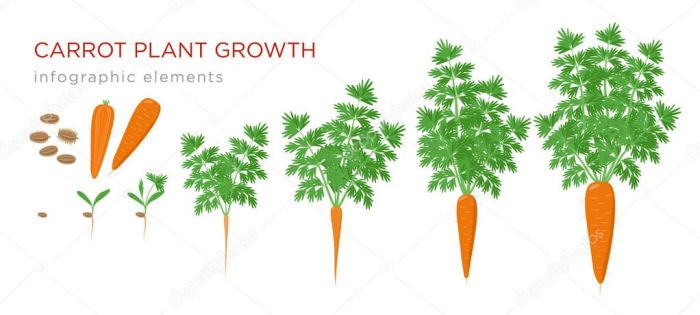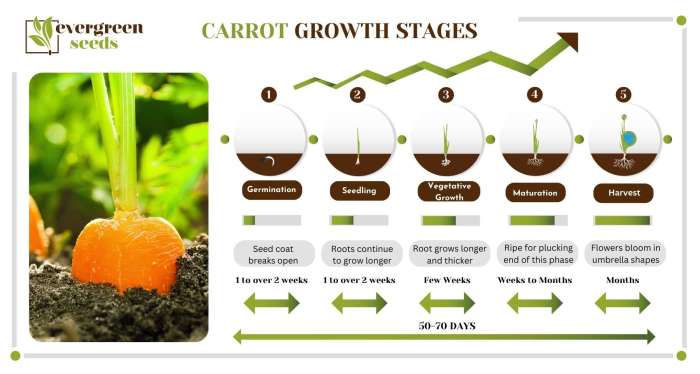Embark on a captivating exploration of carrot stages of growth, a tale that unveils the intricacies of this humble vegetable’s life cycle. From the humble beginnings of germination to the triumphant emergence of a mature root, we delve into the physiological and environmental factors that shape the carrot’s journey.
Join us as we trace the carrot’s transformation from a tiny seed to a culinary delight, unraveling the secrets of its growth and development along the way.
Carrot Stages of Growth
Carrots, a popular root vegetable, go through distinct stages of growth from seed to maturity. Understanding these stages is crucial for successful cultivation and optimizing carrot production.
1. Germination Stage

Germination is the process by which a carrot seed resumes metabolic activity and develops into a seedling. This stage is highly influenced by environmental conditions:
- Water:Seeds require sufficient moisture to initiate germination.
- Temperature:Optimal germination occurs within a specific temperature range, typically between 50-77°F (10-25°C).
- Light:While some carrot varieties prefer darkness for germination, others require exposure to light.
During germination, physiological and biochemical changes occur within the seed:
- Water absorption causes the seed coat to rupture.
- The embryo rehydrates and resumes metabolic activity.
- Enzymes break down stored food reserves, providing energy for growth.
- The radicle (primary root) emerges, followed by the hypocotyl (stem) and cotyledons (seed leaves).
2. Seedling Stage

Once the radicle emerges, the carrot enters the seedling stage. Seedlings are characterized by:
- Morphological features:True leaves emerge, along with a developing root system.
- Physiological characteristics:Photosynthesis begins in the leaves, providing energy for growth.
Environmental factors, such as temperature, light, and soil moisture, play a significant role in seedling growth and establishment.
3. Vegetative Growth Stage

The vegetative growth stage involves the development of the carrot plant above ground. This stage is marked by:
- Leaf growth:Leaves expand in size and number, increasing the plant’s photosynthetic capacity.
- Nutrient acquisition:Leaves absorb nutrients from the soil through their roots.
Factors influencing leaf growth and development include light intensity, nutrient availability, and water supply.
4. Root Growth and Development
Carrot root growth undergoes distinct stages:
- Initiation:The primary root develops into a taproot.
- Elongation:The taproot elongates and thickens, forming the edible carrot.
- Maturity:The root reaches its final size and shape.
Root growth is influenced by factors such as soil texture, moisture, and nutrient availability. Hormones and environmental cues also play a role in root development.
5. Reproductive Growth Stage, Carrot stages of growth
When the carrot reaches maturity, it enters the reproductive growth stage:
- Flowering:Carrot plants produce small, white flowers.
- Seed production:After pollination, the flowers develop into seeds.
Environmental factors, such as temperature and day length, influence flowering and seed set. Pollinators, such as insects and wind, play a crucial role in carrot reproduction.
User Queries: Carrot Stages Of Growth
How long does it take for carrots to germinate?
Carrot seeds typically germinate within 10-14 days under optimal conditions.
What is the ideal temperature for carrot growth?
Carrots prefer temperatures between 55-75°F (13-24°C) for optimal growth.
How deep should I plant carrot seeds?
Plant carrot seeds about 1/4 inch (6mm) deep in well-drained soil.
What are the common pests and diseases that affect carrots?
Common carrot pests include carrot flies, aphids, and spider mites. Diseases include leaf spot, blight, and root rot.
